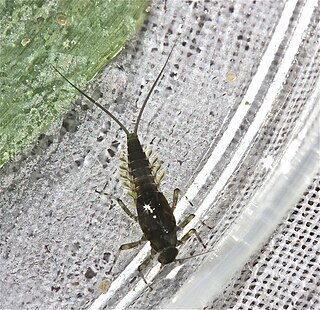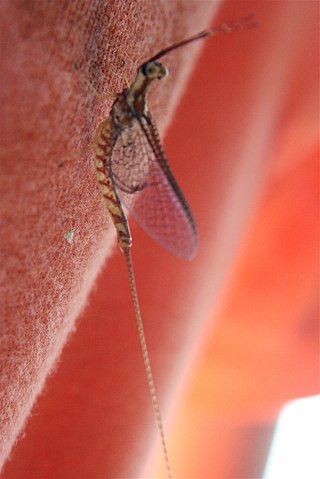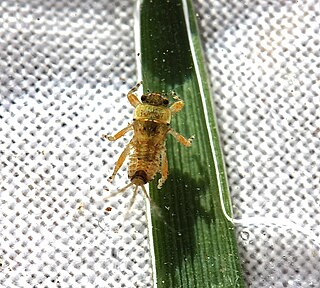
Crambidae comprises the grass moth family of lepidopterans. They are variable in appearance, with the nominal subfamily Crambinae taking up closely folded postures on grass stems where they are inconspicuous, while other subfamilies include brightly coloured and patterned insects that rest in wing-spread attitudes.

Ephemerellidae are known as the spiny crawler mayflies. They are a family of the order Ephemeroptera. There are eight genera consisting of a total 90 species. They are distributed throughout North America as well as the UK. Their habitat is lotic-erosional, they are found in all sizes of flowing streams on different types of substrates where there is reduced flow. They are even found on the shores of lakes and beaches where there is wave action present. They move by swimming and clinging, they are very well camouflaged. Most species have one generation per year. They are mostly collector-gatherers.

Pentagenia, similar to Hexagenia, is a genus of insect in the family Ephemeridae, commonly referred to as burrowing mayflies.

Rhithrogena is a genus of flatheaded mayflies in the family Heptageniidae. There are at least 150 described species in Rhithrogena.

Stenacron is a genus of mayfly in the family Heptageniidae, with a distribution across eastern North America.

Heterocloeon is a genus of small minnow mayflies in the family Baetidae. There are about nine described species in Heterocloeon.
Castnia invaria is a moth in the family Castniidae. It is found in South America.
Neoephemera is a genus of large squaregill mayflies in the family Neoephemeridae first described by McDunnough (1925). and containing approximately six described species in Neoephemera.

Hexagenia is a genus of mayfly in the family Ephemeridae, the common burrower mayflies.

Baetiscidae is a family of mayflies. It contains a single extant genus, Baetisca, native to North America with around 12 species. The family is noted for their spined armoured larvae, which live in flowing water pools and on the edges of streams where they are detritivores, consuming fine particles of organic matter. Three other extinct genera are known, extending back to the Early Cretaceous. They are closely related to Prosopistomatidae which have unusual, beetle-like nymphs as well as the extinct genus Cretomitarcys, with the three groups constituting the clade Carapacea.

Pisciforma is a suborder of mayflies in the order Ephemeroptera. There are at least 410 described species in Pisciforma.
Ephemerella excrucians, the pale morning dun, is a species of spiny crawler mayfly in the family Ephemerellidae. It is found in all of Canada and the continental United States.

Ephemerella is a genus of spiny crawler mayflies in the family Ephemerellidae with a widespread distribution.

Ephemerella subvaria, the red quill, is a species of spiny crawler mayfly in the family Ephemerellidae. It is found in North America.
Ephemerella maculata is a species of spiny crawler mayfly in the family Ephemerellidae. It is found in North America.

Ephemerella tibialis is a species of spiny crawler mayfly in the family Ephemerellidae. It is found in North America.
Ephemerella aurivillii is a species of spiny crawler mayfly in the family Ephemerellidae. It is found in Europem, Northern Asia and North America. In North America its range includes all of Canada, the northern, southwestern United States, and Alaska.

Ephemerella dorothea is a species of spiny crawler mayfly in the family Ephemerellidae. It is found in North America.

Blue-winged Olive flies is a collective term used by anglers in fly fishing to identify a broad array of mayflies having olive, olive-brown bodies and bluish wings in their adult form. Sometimes referred to as BWO, a wide array of artificial flies are tied to imitate adult, nymphal and emerging stages of the aquatic insect. While the family Baetidae probably has the most species identified as blue-winged olives, another mayfly family Ephemerellidae also contains some. Collectively, blue-winged olive mayflies are an important food source in most trout streams, thus their widespread imitation by fly tiers.













